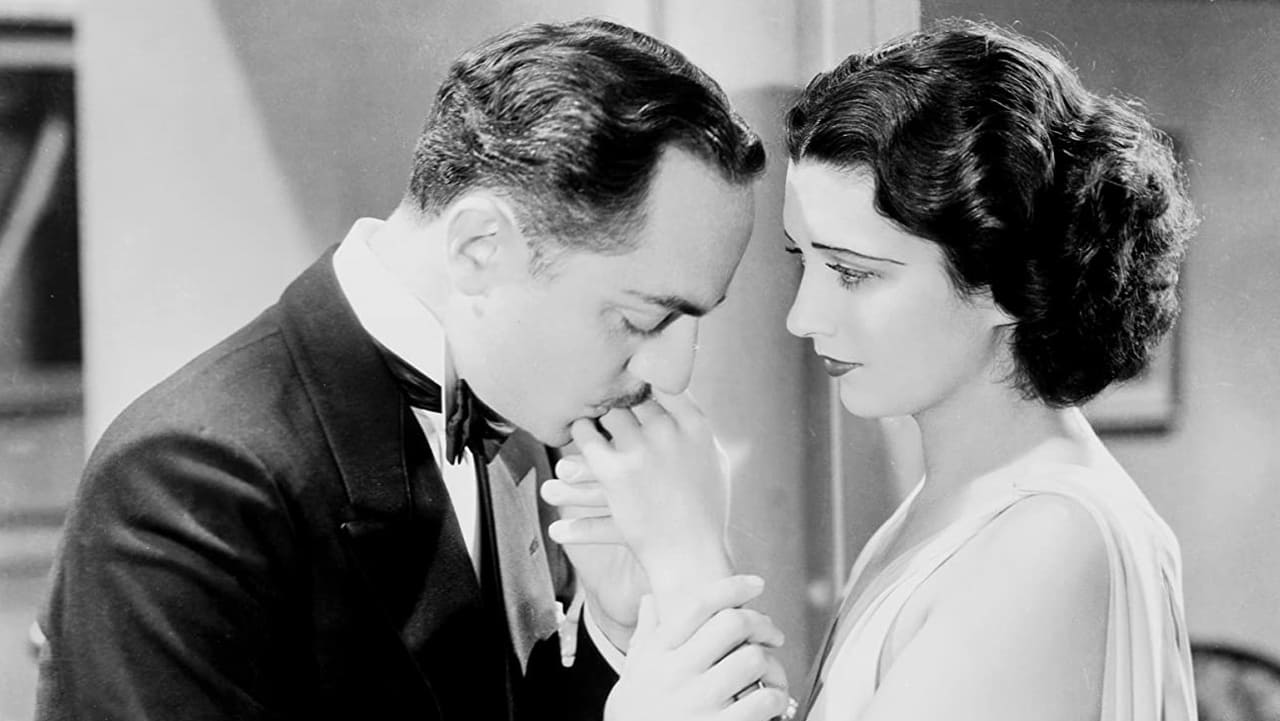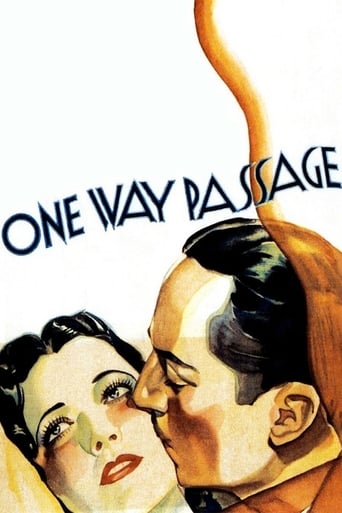



Takes itself way too seriously
Fantastic!
After playing with our expectations, this turns out to be a very different sort of film.
View MoreOne of the most extraordinary films you will see this year. Take that as you want.
View MoreOK, I was cruising along with this cast of characters nicely and figured, oh well we all gotta go sometime, no biggie. Then, the last scene really hit me hard. I was so surprised, given that not much else happens unexpectedly and was even rather annoyed they made such a mess with those glasses.Great credit is due to that pickpocket's laugh, thee best on celluloid to date and even better than that "Simpson's" Nelson punk. It did not annoy and found his antics most humorous, for that era quite an accomplishment.I never got the Kay Francis craze, her girlfriends were much prettier but guess she is an acquired taste. She did look her best in the flowing white/light gowns and several angles enhanced her countenance.Always interesting to see stock footage from the long gone era of Hong Kong, Queen Mary (?), San Quentin, etc. even though the frame inserts were cumbersome cuts. I would have liked to see more from a history POV.High recommend for those pre-code romances (I think I saw a black garter on the dance floor!!), how to make a Paradise Martini (delish) and the advantages of having underworld pals.
View MoreONE WAY PASSAGE (Warner Brothers, 1932), directed by Tay Garnett, is a tender love story set on board a luxury liner that involves a final destination that awaits its two central characters. Of the many shipboard romances that have been produced before and since, this one stood out with an original premise. How original was it? Well, original enough to have earned Robert Lord an Academy Award in the category for Best Original Screenplay. Featuring William Powell and Kay Francis, both new recruits to the Warner studio following their few years at Paramount, ONE WAY PASSAGE is considered by many to be the finest of their nine collaborations together, with Paramount's STREET OF CHANCE (1930) and Warner's JEWEL ROBBERY (1932) being two honorable mentions.As a camera pans towards three vocalists singing "If I Had My Way" in a barroom, the plot takes its toll shortly before the S.S. Maloa leaves port from Hong Kong to San Francisco. Dan Hardesty (William Powell) encounters Joan Ames (Kay Francis), an attractive socialite at the bar where they immediately become attracted to one other. After drinking a toast, they break their champagne glasses on the counter, then part company with Dan bidding farewell to the German phrase, "Auf Wiedersehe." As Joan returns to her friends (Allan Lane and Ruth Hall, Dan waves, heading through the swing doors. At that moment, Dan is approached and handcuffed by Steve Burke (Warren Hymer), a police detective out to capture and deliver his eluding prisoner back to San Quentin to be executed on a murder charge. Later, after falling overboard, Dan sacrifices his freedom by saving Burke from drowning as he notices Joan up on deck among the crowd observing the incident. Because of his "heroic" deed, Burke agrees to let his prisoner roam free after the boat leaves port to spend quality time with Joan. As Dan keeps his past a secret, so does Joan, who suffers from heart disease. Regardless of orders by her doctor Frederick Burton) to give up parties, cigarettes, dancing and cocktails, Joan chooses to enjoy whatever time allows in the company of her newfound lover during the four week ocean voyage. Also along for the ride are "Skippy" (Frank McHugh), Dan's friend and professional pickpocket, and "Barrelhouse Betty" (Aline MacMahon), a confidence woman posing as the accented speaking "Countess Barilhaud" who keeps Burke's attention while Dan schemes his getaway during the ship's stopover in Honolulu.Film buffs should take notice by the familiar faces in uncredited roles including Roscoe Karns (The Bartender); Douglas Gerrard (Sir Harold); Herbert Mundin (The Steward); Stanley Fields (The Captain); and Dewey Robinson (The Honolulu Contact). Director Tay Garnett keeps the action afloat through notification of time frame with superimposed numerical days listed on screen every few minutes. So well received in 1932 that Warners retold the story eight years later under its new title, TILL WE MEET AGAIN (1940). Starring Merle Oberon, George Brent and Pat O'Brien in the Francis, Powell and Hymer roles, with Binnie Barnes filling in for MacMahon, Frank McHugh reprises his role under a different character name, Rockie T. Rockingham. Interestingly the remake, which follows the original quite closely, happens to be a half hour longer than its originally released 67 minute product. Unlike Turner Classic Movies where both versions have been presented since its 1994 cable TV premiere, many local television stations during the pre-cable TV era very much preferred broadcasting the 1940 edition during the 1960s and 70s as opposed to the original. Take note that both versions contained the oft-played underscoring theme to "Where Was I?"Nearly perfect storytelling, its only main disappointment is the casting of Warren Hymer as the cop out keeping his prisoner under tight observation while on board. Warners stock players as Allen Jenkins or better yet, Guy Kibbee, might have fit the bill to perfection, but no doubt were unavailable. Hymer, best known for playing dopey sidekicks or gangsters, tries his best playing it tough and straight. Unfortunately his comical looking face gets in the way, making his performance hard to be taken seriously. The remake redeems itself with the casting of the no-nonsense O'Brien in Hymer's original role. Had O'Brien been contracted at Warners at this time, maybe he would have been assigned that part. Powell and Francis as doomed lovers handle their roles convincingly. At first glance, Powell seemed to be all wrong playing the condemned killer, but as the movie progresses, so does any doubt of Powell's ability in handling such an offbeat role. Under incapable direction or miscasting, ONE WAY PASSAGE could have turned into a forgettable programmer with unintentional laughs by its viewers. Speaking of laughs, MacMahon and McHugh as secondary couple with questionable pasts, offer some amusements that occur between dramatic interchanges to balance the story. McHugh's trademark "ha ha" laughter and drunken mannerisms offer some bright spots to a point while MacMahon's straight-lace humor comes across naturally. Considering its age, ONE WAY PASSAGE holds up remarkably well, especially the memorable New Year's Eve sequence at Aqua Caliente that should still leave a lump in one's throat long after the movie is over. Auf Wiedersehe.(***)
View MoreThis delicate shipboard romance was a popular favorite in its time and it's not hard to see why. Robert Lord grabbed a well-earned Oscar for his original story, a fanciful but ingenious doomed lovers yarn that must have offered solace to Depression-era audiences whose miseries could only pale next to those of hard-luck leads William Powell and Kay Francis.The elegant pair fall in love on a Frisco-bound ocean liner, each harboring a terrible secret that curtails their future happiness -- he's a convicted murderer returning to the gallows, she has a heart ailment and is living on borrowed time. Never mind why a dying woman is aboard a cruise ship instead of being ensconced in a terminal ward. Or why the authorities would send thick-witted Warren Hymer of all cops to bring in Powell.This is irresistible hoke, and the director Tay Garnet invests it with wonderfully eccentric touches (like the burly lesbian among the trio of portly harmonizers in a Hong Kong bar) and innovative dream-like imagery (i.e., the startling camera zoom when Powell spots Francis at the ship's railing). He also manages the near-impossible feat of keeping Francis, the lisping clotheshorse, to a minimum of cloying eye-rolls, with no small help from Powell's wry and charmingly self-effacing performance.The heavy sentiment is deftly balanced by the sparkling deadpan humor of Aline MacMahon as the Russian Countess Barrelhaus (in actuality the Brooklyn con-artist, Barrel House Betty), who conspires with perpetual drunk Frank McHugh (his grating presence is the film's sole detriment) to assist the lovers.The coda, set in a Mexican bar on New Year's Eve, is unforgettable.
View MoreA shipboard tale of doomed lovers, ONE WAY PASSAGE manages to be interesting despite the shaky premise that lovers can meet, fall in love instantly and all the while harboring deep secrets that neither one is willing to reveal. It makes for great cinema if done properly and this version of the weepy tale almost succeeds.The biggest drawback is the need to have comedy relief in the form of FRANK McHUGH, who overplays his role as a drunken thief in cohorts with a confidence woman, ALINE MacMAHON. While MacMahone manages to make her fake Countess a believable enough character, McHugh overplays his sing-song laugh and drunken bits of humor so outrageously that the story falls apart whenever he gets extensive footage.If the tale had been confined to Miss Francis and Powell, director Tay Garnett would have gotten better results. He manages the direction very well, especially for that neat little ending which gives the story the sort of lift you'd never expect.Kay Francis is assured and lovely as the doomed woman enroute to a sanitarium and William Powell is debonair as the man who takes one glance at her and falls deeply in love, but is on his way to San Quentin on a murder charge. WARREN HYMER, as a dumb cop, is another example of the film's penchant for weak comedy relief.All it lacks is a heavy use of violins on the soundtrack to glorify the romance--but it manages to be "an affair to remember," 1930s style, despite some weaknesses.
View More